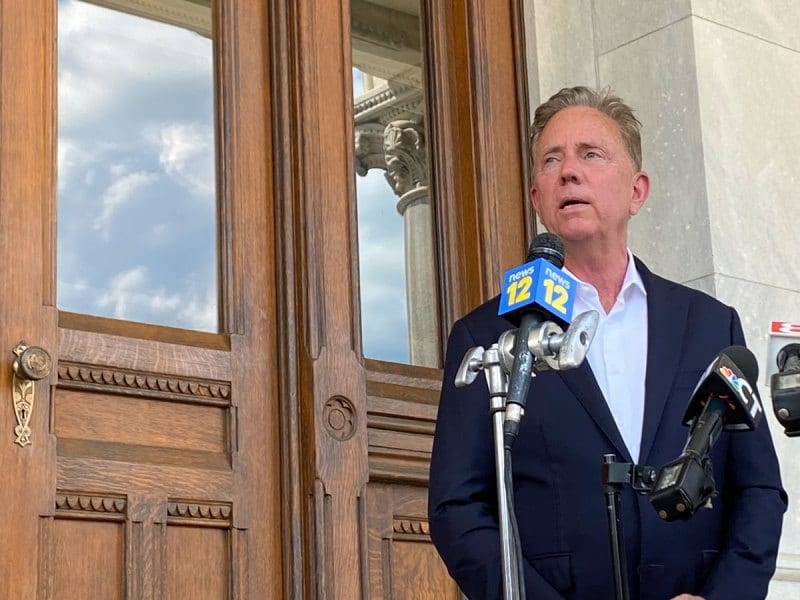Governor Requests Extension of Executive Power

Audio By Carbonatix

Gov. Ned Lamont speaks to reporters. Photo credit: Christine Stuart, CTNewsJunkie.com
Gov. Ned Lamont is looking to extend 11 of the pandemic-related executive orders that are set to expire on July 20.
By Hugh McQuaid, CTNewsJunkie.com
Gov. Ned Lamont made a case for extending his emergency authority and 11 ongoing pandemic-related executive orders through Sept. 30 in a five-page letter to legislative leaders Thursday.
Lamont called for the legislature to convene for a special session on Wednesday to extend two emergency declarations which have been in place since last March and have given him the authority to issue more than 300 executive orders aimed at managing the coronavirus pandemic. Many of those orders have already expired or been codified and, according to his letter, the governor plans to extend 11 of them.
“These orders are still needed to protect the public and continue critical measures to provide healthcare access and economic relief and respond to evolving changes,” Lamont wrote. “They are also narrowly targeted to achieve specific goals that would otherwise be unachievable because of statutory or regulatory barriers that were not contemplated in the context of a highly transmissible and long-lasting disease outbreak when the statutes were passed.”
In the letter, the governor explained his rationale for keeping several of the remaining executive orders in place beyond this month. Lamont cited orders that:
- Give the Department of Public Health the flexibility to manage planned new vaccine clinics at commuter parking lots, which go live on July 30.
- Two remaining orders waive statutory processes that would slow DPH efforts to negotiate vaccine redistribution contracts with hospitals.
- An order is being used to provide non-congregate housing in hotel rooms rather than homeless or domestic violence shelters and enables the state to collect federal reimbursement for these costs.
- An order allows DPH to require masks in certain areas where risk of COVID transmission remains high or the population is especially vulnerable.
- Allows the Departments of Education and Early Childhood Development to set COVID safety policies in schools and childcare facilities ahead of the upcoming school year.
- A remaining order gives tenants behind on their payments additional time to repay back rent or access federal relief funds now that the state eviction moratorium has expired.
- Allows the state to continue to collect federal reimbursements for food assistance programs.
If approved by lawmakers, the request would extend the emergency declarations a little over two months beyond their current expiration date of July 20. A temporary framework enacted this year allows the governor to request extensions of up to roughly six months when the legislature is not in session.
Senate President Martin Looney said the governor’s letter effectively justified the continuation of the emergency declarations, especially as the more-infectious Delta variant has caused severe consequences in other areas.
“I think what he’s asking for is reasonable,” Looney said Friday. “We need to recognize that we are still not in the clear of this pandemic and there are certain things that only the executive branch can move on quickly when quick action is required.”
A spokesman for House Democrats said the caucus planned to meet and discuss Lamont’s request.
Republicans have long taken the position that further extensions of the emergency declarations are unnecessary, pointing to Connecticut’s low COVID infection and hospitalization numbers as well as the state’s high vaccination rate.
Throughout the pandemic, Lamont has maintained two emergency declarations. One stems from a public health statute, the other a civil preparedness law. House Minority Leader Vincent Candelora said Friday that extending the civil preparedness emergency was a “non-starter.”
“Everything he’s pointing to in his letter is public health-related. So I’m concerned, in a state that has one-party rule, that we would be granting a civil preparedness emergency as well,” Candelora said.
He said he doubted the governor would be given the same latitude if he were a Republican or if control of the legislature were split between the two parties.
“These broad brush grants of power still give me grave concern despite the fact that we could argue that the governor has used it judiciously,” Candelora said.
Senate Republicans have also opposed an extension. Minority leaders, Sen. Kevin Kelly, R-Stratford, and Sen. Paul Formica, R-East Lyme, released a joint statement calling the governor’s request an “overreach of power.”
“The legislature was elected to be the voice of their constituents – the people. Every issue the Governor raised as a reason for executive powers can be addressed by the legislature in a timely fashion,” Kelly and Formica said.
Republished with permission from CTNewsJunkie.com, all rights reserved.
Like what you see here? Click here to subscribe to We-Ha’s newsletter so you’ll always be in the know about what’s happening in West Hartford! Click the blue button below to become a supporter of We-Ha.com and our efforts to continue producing quality journalism.



